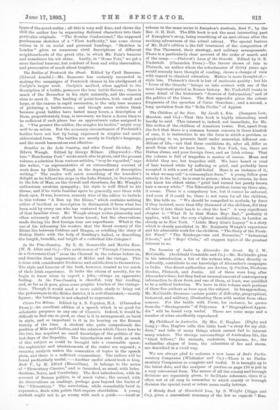Cicero Pro Maine. Edited by A. B. Poynton, M.A. (Clarendon
Press.)—An excellent edition of a speech which is as good for scholastic purposes as any one of Cicero's. Indeed, it would be difficult to find one so good, so clear is it in arrangement, so lucid in style, and so important is it in its bearing on the Roman history of the time. A student who quite comprehends the position of Milo and Clodius, and the relation which Cicero bore to the two, has acquired no small knowledge of the politics of the last days of the'Republic. The introduction sets forth as much of this subject as could be brought into a reasonable space; the sophistries and misstatements of the orator are exposed ; running analysis makes the connection of topics in the speech plain, and there is a sufficient commentary. The indices will be found particularly useful.—Another useful school-book is Livy, Book V., by M. Alford (Macmillan), It belongs to the series of "Elementary Classics," and is furnished, as usual, with Intro. .ductions, Notes, and Vocabulary. The first introduction, with its account of Roman politics, is of much value ; the second, with its observations on readings, perhaps goes beyond the limits of the " Elementary." The annotation, while remarkably brief in expression, deals with points that require elucidation. A young student ought not to go wrong with such a guide.—Another
volume in the same series is Xenophon's Anabasis, Book V., by the Rev. G. H. Hall. The fifth book is not the most interesting part of Xenophon's story, being something of an anti-climax after the exciting adventures of the actual retreat. The special feature of Mr. Hall's edition is the full treatment of the composition of the Ten Thousand, their strategy, and military arrangements. There is a particularly clear account of the order of march and of the camp.—Plutarch's Lives of the Gracchi. Edited by G. E. Underhill. (Clarendon Press.)—The favour shown of late to Plutarch, an author whom the schoolmaster of thirty years ago would scarcely have thought of reading, shows a change of view with regard to classical education. Matter is more thought of,— style less. Plutarch's Greek is but of moderate quality ; but his " Lives of the Gracchi " brings us into contact with one of the most important period in Roman history. Mr. Underhill treats in some detail of the historian's "Sources of Information," and of the politics of the times. The first appendix gives the extant fragments of the speeches of Caine Gracchus ; and a second, a long quotation from the " Bella Civilia" of Appian.


































 Previous page
Previous page